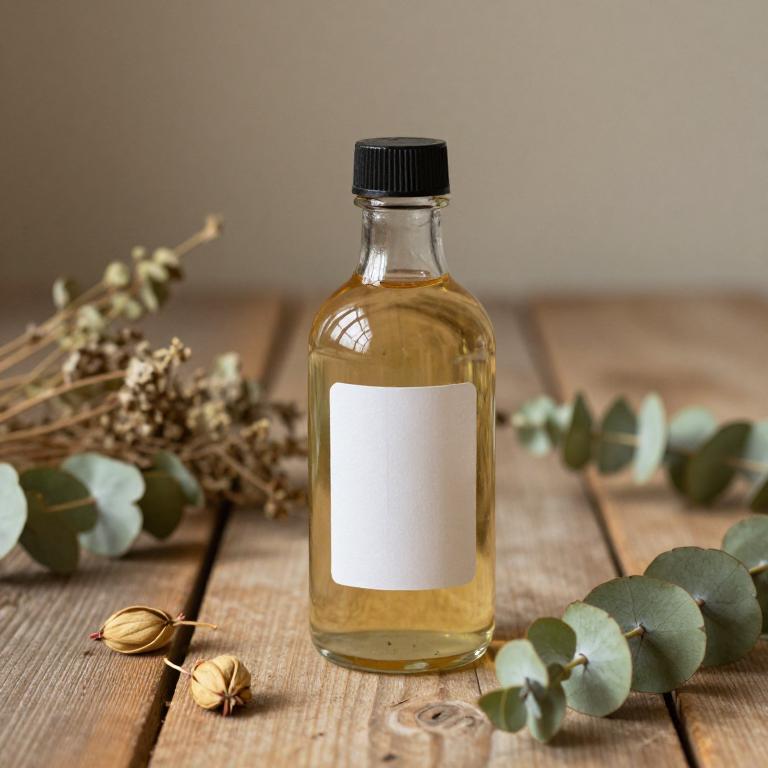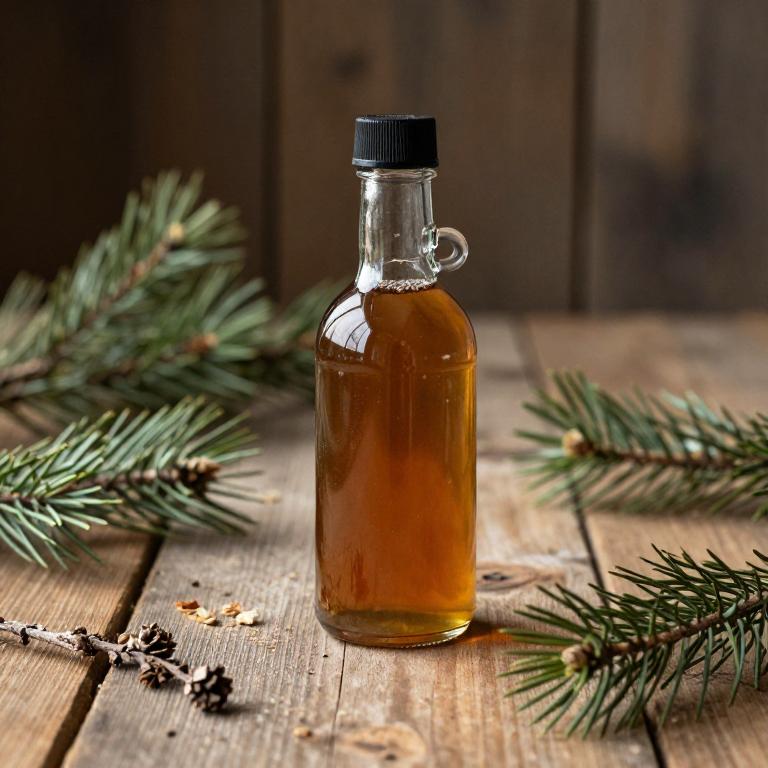10 Best Herbal Syrups For Chest Congestion

Herbal syrups are traditional remedies commonly used to alleviate symptoms of chest congestion by soothing the respiratory tract and reducing mucus buildup.
These syrups often contain natural ingredients such as eucalyptus, ginger, thyme, and licorice root, which have expectorant, anti-inflammatory, and antispasmodic properties. They are particularly effective for individuals seeking a natural alternative to over-the-counter medications, especially those who prefer to avoid synthetic chemicals. Many herbal syrups are available in various formulations, including those tailored for children or individuals with specific allergies.
When used as directed, these syrups can provide relief from coughing, throat irritation, and difficulty breathing associated with chest congestion.
Table of Contents
- 1. Eucalyptus (Eucalyptus globulus)
- 2. Ginger (Zingiber officinale)
- 3. Peppermint (Mentha piperita)
- 4. Thyme (Thymus vulgaris)
- 5. Licorice (Glycyrrhiza glabra)
- 6. Fennel (Foeniculum vulgare)
- 7. Rosemary (Rosmarinus officinalis)
- 8. Scots pine (Pinus sylvestris)
- 9. Black pepper (Piper nigrum)
- 10. Salvia (Salvia officinalis)
1. Eucalyptus (Eucalyptus globulus)

Eucalyptus globulus, commonly known as the Tasmanian blue gum, is widely used in herbal syrups to alleviate symptoms of chest congestion due to its expectorant and anti-inflammatory properties.
These syrups often contain eucalyptus oil, which helps to loosen mucus and ease breathing by reducing the thickness of respiratory secretions. The aromatic compounds in eucalyptus globulus can also provide a soothing effect, helping to relieve coughing and irritation in the throat. When used as a natural remedy, these syrups are generally considered safe for adults and children, though they should be used according to recommended dosages.
They are particularly beneficial for individuals suffering from colds, bronchitis, or other respiratory conditions that cause chest congestion.
2. Ginger (Zingiber officinale)

Zingiber officinale, commonly known as ginger, has been traditionally used to alleviate chest congestion due to its anti-inflammatory and expectorant properties.
When prepared as an herbal syrup, ginger can help loosen mucus and reduce inflammation in the respiratory tract, making it easier to expel phlegm. The active compounds in ginger, such as gingerol and shogaol, contribute to its effectiveness in soothing coughs and reducing throat irritation. This natural remedy is often preferred by individuals seeking alternatives to over-the-counter medications, especially for mild to moderate chest congestion.
However, it is advisable to consult a healthcare professional before using ginger syrup, especially for those with underlying health conditions or who are taking other medications.
3. Peppermint (Mentha piperita)

Mentha piperita, commonly known as peppermint, is widely used in herbal syrups to alleviate symptoms of chest congestion due to its expectorant and decongestant properties.
These syrups help loosen mucus in the airways, making it easier to cough up and clear the respiratory tract. The aromatic compounds in peppermint also provide a soothing effect, reducing irritation and easing breathing in individuals with coughs or bronchial inflammation. Peppermint herbal syrups are often combined with other herbs like eucalyptus or thyme to enhance their therapeutic benefits.
They are generally considered safe for adults and children when used as directed, though they should be avoided by those with certain medical conditions or allergies.
4. Thyme (Thymus vulgaris)

Thymus vulgaris, commonly known as thyme, is a popular herb used in herbal syrups to alleviate chest congestion due to its potent anti-inflammatory and antimicrobial properties.
These syrups often contain essential oils like thymol, which help to loosen mucus and reduce inflammation in the respiratory tract. Thyme syrup is traditionally used to treat coughs, bronchitis, and other respiratory infections by soothing the throat and improving breathing. Its warming effect can also help to clear nasal passages and ease breathing in individuals with persistent congestion.
When used as part of a holistic approach, thymus vulgaris herbal syrups may provide natural relief for mild to moderate chest congestion.
5. Licorice (Glycyrrhiza glabra)

Glycyrrhiza glabra, commonly known as licorice root, has been traditionally used in herbal medicine to alleviate symptoms of chest congestion due to its expectorant and anti-inflammatory properties.
Herbal syrups made from licorice root can help loosen mucus in the respiratory tract, making it easier to cough up and relieve breathing difficulties. These syrups are often combined with other herbs like thyme or eucalyptus to enhance their effectiveness in treating coughs and bronchitis. However, long-term use of licorice syrup should be monitored, as excessive consumption may lead to side effects such as high blood pressure or fluid retention.
Overall, licorice-based herbal syrups offer a natural alternative for managing chest congestion, though they should be used under the guidance of a healthcare professional.
6. Fennel (Foeniculum vulgare)

Foeniculum vulgare, commonly known as fennel, is often used in herbal syrups to alleviate chest congestion due to its expectorant and anti-inflammatory properties.
These syrups help loosen mucus and ease breathing by stimulating the production of thinner secretions in the respiratory tract. Fennel also contains compounds like anethole and apiol, which have been traditionally used to soothe coughs and reduce inflammation in the airways. When consumed as a syrup, it can be particularly beneficial for individuals suffering from bronchitis or the common cold.
However, it is important to consult a healthcare provider before use, especially for children or those with existing medical conditions.
7. Rosemary (Rosmarinus officinalis)

Rosmarinus officinalis, commonly known as rosemary, is often used in herbal syrups to help alleviate symptoms of chest congestion due to its expectorant and anti-inflammatory properties.
These syrups typically combine rosemary with other herbs like thyme, eucalyptus, and garlic to enhance their effectiveness in loosening mucus and reducing respiratory irritation. The essential oils in rosemary, particularly cineole and camphor, contribute to its ability to soothe the respiratory tract and promote easier breathing. When taken as a herbal syrup, rosemary can provide a natural and gentle relief for individuals suffering from mild to moderate chest congestion.
However, it is important to consult a healthcare professional before use, especially for those with underlying health conditions or who are taking other medications.
8. Scots pine (Pinus sylvestris)

Pinus sylvestris, commonly known as Scots pine, has been traditionally used in herbal medicine for its soothing effects on respiratory health.
The resin and sap of the pine tree are often harvested and processed into herbal syrups, which are valued for their potential to alleviate chest congestion and support respiratory function. These syrups are believed to have expectorant properties, helping to loosen mucus and ease breathing in individuals suffering from colds, bronchitis, or other respiratory conditions. The aromatic compounds in Scots pine syrup may also provide a calming effect, reducing irritation in the throat and airways.
While not a substitute for medical treatment, pine syrup is often used as a natural remedy to complement conventional care for mild respiratory symptoms.
9. Black pepper (Piper nigrum)

Piper nigrum, commonly known as black pepper, is often used in herbal syrups to help alleviate chest congestion due to its warming and expectorant properties.
These syrups typically combine black pepper with other herbs like ginger, eucalyptus, and turmeric to enhance their effectiveness in loosening mucus and soothing irritated airways. The active compound piperine in black pepper may help improve the absorption of other ingredients, making the syrup more potent. Herbal syrups containing piper nigrum are often recommended for their natural approach to respiratory support, especially in cases of mild to moderate chest congestion.
However, it is important to consult a healthcare provider before use, particularly for individuals with underlying health conditions or those taking other medications.
10. Salvia (Salvia officinalis)

Salvia officinalis, commonly known as sage, is often used in herbal syrups to alleviate symptoms of chest congestion due to its expectorant and anti-inflammatory properties.
These syrups typically contain a blend of sage extract, honey, and other soothing herbs like thyme or eucalyptus, which work together to loosen mucus and reduce irritation in the respiratory tract. The antimicrobial qualities of sage may also help combat lingering infections that contribute to persistent congestion. When used as a natural remedy, sage-based syrups can provide gentle relief without the side effects often associated with over-the-counter medications.
However, it is important to consult with a healthcare provider before using these syrups, especially for children or individuals with existing medical conditions.